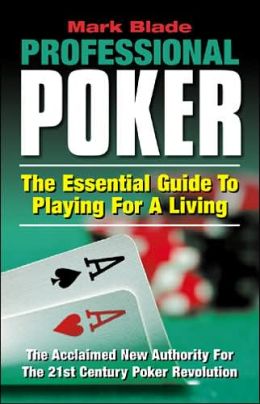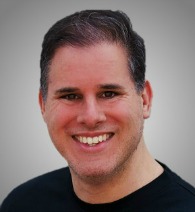This appeared in Card Player Magazine on April 18, 2006.
Don’t Turn Pro…Before Reading This Book
Professional Poker: The Essential Guide To Playing For A Living by Mark Blade (Brownfield Publishing)
You’ve never had to reload your online account. Your home game would prefer it if you’d just stop coming. You tear up the local cardroom. And you consistently cash in tournaments. You are, in other words, an excellent poker player. In fact, you are a winning poker player. But do not—I repeat do not—even think of turning professional. At the very least, do not decide to go pro until you’ve read Mark Blade’s book Professional Poker.
Obviously, he didn’t set out to write a book to dissuade you from turning pro. But much of the book reads like a cautionary tale, a comprehensive and cogent analysis of why you shouldn’t move to Las Vegas. In fact, he opens with a chapter titled “Should you quit your day job?” It’s sobering reading if you’ve ever said something to yourself like, “I’m a winning player on Friday nights so I’ll be a winning player full-time.” It sounds plausible, until you realize that Friday evenings are probably one of the loosest times at the casino; a winning “Friday night” player might have a lot more losses if he were playing Monday evenings. But the even bigger difference, according to Blade, is that you play differently “when the rent money is on the line.”
It’s a great beginning to this useful book because it makes you think, rigorously, about the consequences of the decision to go pro. Blade wants you to understand what a career in poker really entails, both financially and emotionally. But let’s say you’ve made up your mind and you’re going pro. Professional Poker is packed with practical advice on the business of playing poker for a living, most notably in the second part of the book, on money management. It’s an area that Blade says is “the most generally misunderstood topic within the poker world,” and, talent aside, it’s probably the biggest potential source of failure for would-be professionals.
That’s because if you’re a professional poker player, you cannot go broke. Money is your raw material, your essential resource, and without it, you can’t even sit down at the poker table. Without money, the best player in the world is not a player at all. That may seem obvious—well, it is obvious—but the fact is that many good players forget that luck can be cruel to even the best bankroll.
Section 3 of the book, “The Education of a Pro Player,” includes a short overview of the major books that any pro should have read and mastered (in fact, any serious player should be intimately familiar with each) as well as a section on poker odds. Blade could have done without this discussion of poker math; if you need instruction on understanding odds and their implications for the game, you shouldn’t even toying with the idea of turning professional. (The content itself is fine, but it feels out of place in the context of this book and its subject.)
Finally, Blade covers the behavioral and emotional aspects of playing professionally. Will you be proud to tell people what you do for a living? How difficult is it to have a life (especially with a family) and play professional poker? What can happen to your health, both physical and mental, if you play cards for 40 hours a week? And—this might be the most important factor to consider—will you continue to enjoy the game you love once you play for a living instead for recreation? It’s pretty easy to romanticize the life of the professional, but poker, even recreational poker, can often be tedious. Tedium is never fun, but it’s also quite dangerous. Queen-nine starts to look pretty good if you haven’t played a hand in two hours.
Of course, there’s one more emotional factor to consider before embarking on a career as a poker player. How do you deal with frustration? How will you respond to miracle suck-outs (which you should welcome in the long-run)? What if you posted a losing session every day for three months? How will you feel (how will you play) if you don’t cash in a tournament for a year? Any of these things can happen—and they do happen—to even the very best players. How you play in the wake of that kind of frustration will play a huge part in your ultimate success—or failure.
I’d be lying to you if I said I didn’t think about playing full-time occasionally. But I’d be lying to myself if I ever thought it was in the cards. I hope some of you reading this magazine become poker professionals, but I urge all of you considering that career choice to read Professional Poker. The book by itself won’t make you a successful professional, but failure to heed its lessons could easily turn your bid to go pro into a bust.
If interested in buying it or learning more about it on Amazon.com, please Click Here. (aff link)



